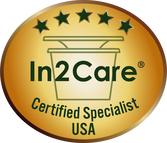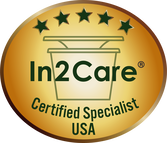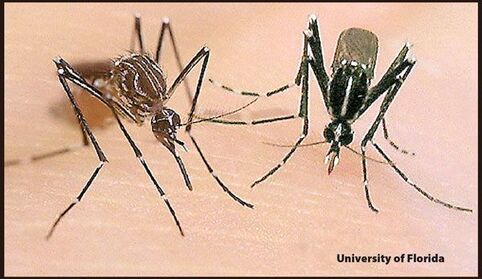
Mosquitoes in Florida
Anyone living in Florida can attest to the nuisance of mosquitoes. Buzzing around
and inflicting painful bites, these insects have always limited our enjoyment of the outdoors. Recent reports of travel-associated cases of Zika virus infections brought mosquitoes to the forefront. Keep on reading for what you need to know about mosquitoes, the diseases that they vector, and management options.
Mosquitoes – What You Need To Know
There are many different species of mosquitoes in Florida. Some are abundant and found
throughout the state and some have limited distributions to very small areas. All mosquitoes feed on sugar sources such as flower nectar for energy, and feed on blood as a precursor for egg laying.
Mosquitoes lay eggs in or near water, with the precise location unique to the mosquito species. For example, floodwater Culex mosquitoes, which are vectors for encephalitis and dog heartworm, lay eggs in water. In contrast, the Yellow Fever mosquito lays eggs above the waterline in containers. The location and pattern of the eggs can often be used in identification! The egg laying location is also of vital importance for mosquito control measure techniques.
The mosquito species present in Central Florida are vectors for many human and animal diseases and parasites including Eastern Equine Encephalitis, Saint Louis Encephalitis, Malaria, West Nile Virus, Dog Heartworm, Dengue Fever, Chikungunya, and Zika. Of these, the latter four have been recently-reported in Florida.
Integrated Mosquito Management
Mosquito management must target mosquitoes in all life stages and be consistent to maintain significant suppression. Management involves reduction and identification of mosquito breeding sites, treatment of mosquito larvae using labeled larvicides, and treatment for adult mosquitoes in landscapes and around the exterior of structures. Mosquito treatment options include one-time treatments for short-period mosquito suppression to ongoing monitoring and targeted applications for long-term mosquito management.
Anyone living in Florida can attest to the nuisance of mosquitoes. Buzzing around
and inflicting painful bites, these insects have always limited our enjoyment of the outdoors. Recent reports of travel-associated cases of Zika virus infections brought mosquitoes to the forefront. Keep on reading for what you need to know about mosquitoes, the diseases that they vector, and management options.
Mosquitoes – What You Need To Know
There are many different species of mosquitoes in Florida. Some are abundant and found
throughout the state and some have limited distributions to very small areas. All mosquitoes feed on sugar sources such as flower nectar for energy, and feed on blood as a precursor for egg laying.
Mosquitoes lay eggs in or near water, with the precise location unique to the mosquito species. For example, floodwater Culex mosquitoes, which are vectors for encephalitis and dog heartworm, lay eggs in water. In contrast, the Yellow Fever mosquito lays eggs above the waterline in containers. The location and pattern of the eggs can often be used in identification! The egg laying location is also of vital importance for mosquito control measure techniques.
The mosquito species present in Central Florida are vectors for many human and animal diseases and parasites including Eastern Equine Encephalitis, Saint Louis Encephalitis, Malaria, West Nile Virus, Dog Heartworm, Dengue Fever, Chikungunya, and Zika. Of these, the latter four have been recently-reported in Florida.
Integrated Mosquito Management
Mosquito management must target mosquitoes in all life stages and be consistent to maintain significant suppression. Management involves reduction and identification of mosquito breeding sites, treatment of mosquito larvae using labeled larvicides, and treatment for adult mosquitoes in landscapes and around the exterior of structures. Mosquito treatment options include one-time treatments for short-period mosquito suppression to ongoing monitoring and targeted applications for long-term mosquito management.

In2Care Mosquito Management
As an In2Care Certified Specialist, we are happy to offer this effective and innovative solution for mosquito management.
Click here for more information
As an In2Care Certified Specialist, we are happy to offer this effective and innovative solution for mosquito management.
Click here for more information

